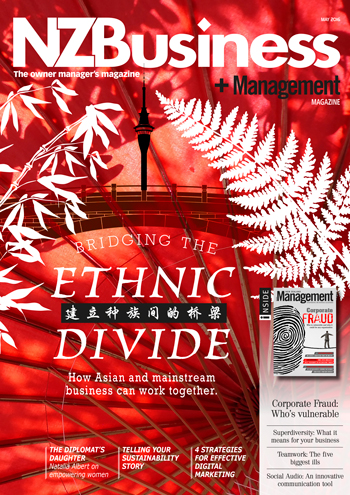Bridging the ethnic divide
In recent years New Zealand’s business landscape has had a seismic shift in its ethnic make-up – particularly with the growth in Asian businesses in Auckland. We examine this amazing diversity and meet some of the forward-thinking business leaders working to bring the Asian and mainstream business communities together.
In recent years New Zealand’s business landscape has had a seismic shift in its ethnic make-up – particularly with the growth in Asian businesses in Auckland. We examine this amazing diversity and meet some of the forward-thinking business leaders working to bring the Asian and mainstream business communities together.
By Glenn Baker.
For someone who’s lived in Auckland on and off for the past three decades, it’s easy to see the fundamental changes in the city’s ethnic make-up over that time. It’s evident in our neighbourhoods, hospitals, schools and tertiary institutions, and proportionately it’s evident in the ownership of business enterprises.
This story looks at the impact Asian-owned businesses are having on the landscape – business owners broadly listed under the heading ‘Asian’; people who originated in a region spanning Japan and South Korea, through Southeast Asia, and into India. Diverse cultures and religions, and vastly different attitudes, strengths and styles when it comes to business management.
Attaching up-to-date statistics to this diversity is not easy – however, the 2013 Census sheds light on our population make-up. Not surprisingly, Chinese are New Zealand’s largest Asian ethnic group. With 171,411 people, three years ago they made up over a third of the Asian ethnic group. Indians were second with 155,178; just under a third.
Overall, there were 540,000 Asians living here. By 2026 Asians are expected to make up almost 16 percent of the population.
For business ownership, figures are even harder to come by. An EY survey conducted for New Zealand Asian Leaders three years ago covering the top 100 NZX firms, revealed just 17 percent had Asians as directors or senior executives; 13 percent had Asians in their executive teams and five percent had Asians on their boards. But this ignores the large number of small Asian owned businesses; a walk along Dominion Road or almost any other Auckland shopping strip provides clues as to their increasing ubiquity, as do the brands on some tradie vans. (‘Malaysia Chinese Painter’ is one I’ve personally seen recently.)
Let’s examine some realities. For a large percentage of Asians, business and trading is in their DNA. When migrating to a new country, particularly a business-friendly nation such as New Zealand, often the easiest way to get established is to invest in a business. Back home, running a business was often the only way they knew how to make a living, so they’re willing to take the risk here.
The key though for Asian business owners, is to engage with other mainstream businesses, and the mainstream population, to maximise their chances for success. Equally the reverse applies for established mainstream Kiwi businesses – rather than see these relative newcomers as a threat, they too should explore joint efforts to access opportunities they may otherwise miss out on.
“Newcomers to the Kiwi business community likely need help understanding what acceptable practice is and navigating the language of New Zealand business.”
– Marisa Fong.
The challenge is to bridge the divide separating the communities – to ignore it is counterproductive in the long term, both for domestic and international trade.
There are organisations in this country addressing this challenge and attempting to bring business ethnicities together, but the question is, are enough businesses on both sides of the divide committed to the cause?
When it comes to encouraging collaboration, one person and one organisation stands out for their work over the past three years. Auckland lawyer Mai Chen of ChenPalmer Partners set up New Zealand Asian Leaders (NZAL) in 2013 to identify and bring together top Asian business and community leaders from New Zealand and overseas.
“The purpose was to show the number of top Asian leaders there were and for them to be a bridge between their home countries, new migrants and mainstream New Zealanders,” she says. There’re now almost 200 NZAL members who are top leaders and emerging and young Asian leaders. “I wanted more people to tap their wisdom and expertise and more collaboration to maximise the diversity dividend that Asian New Zealanders can create for the economy and the country.”
NZAL (nzasianleaders.com) conducts a number of initiatives to foster greater understanding and collaboration. Chen founded the Superdiversity Centre for Law, Policy and Business to provide a range of research and services, including ways for businesses leveraging off Superdiversity to beat the competition.
(Turn to Management magazine for insights from Chen’s research and book Superdiversity Stocktake. She talks to Management about New Zealand’s ‘diversity dividend’ from our superdiversity, and the need to invest in it.)
Towards greater collaboration
NZBusiness approached a cross-section of local Asian business leaders for their thoughts on how to close the cultural divide and encourage collaboration.
Mai Chen says it begins with all business owners and leaders valuing the knowledge of cultures and languages of Kiwis not born here, and valuing those with experience in lucrative Asian markets.
“It is also understanding that the domestic market is changing, with many more ethnic minorities comprising a critical mass of customers; that recruiting from the market, to service that market, is important.
“Collaboration is good for business, including between Maori and Asian New Zealanders who can help channel goods and services to lucrative Asian markets,” she adds.
Her advice? “Developing your cultural capability to do business with Asians is critical. Deepening your knowledge about the Asian countries and businesses you want to collaborate with is key. Hiring good Asian staff can help too.”
NZAL member Marisa Fong co-founded Madison Recruitment, the largest privately owned recruitment company in New Zealand when it was sold in 2013, and describes herself as an entrepreneur, investor, director and speaker. She has also recently launched, in partnership, a new venture (TBC Partners) supporting owners of private enterprise on their entrepreneurial journey. Fong doubts that much progress is being made in integrating the two business communities. It’s a case of good intentions but little follow-through.
“Certainly the environment for doing business here is free and open but I don’t know how that’s translating into meaningful enterprises. And I’m always concerned when there’re anti-Asian sentiments, such as the recent rhetoric resulting from the comments on immigration policy for semi-skilled labour from Andrew Little and Winston Peters.”
Fong thinks there’s room for improvement in creating better pathways for collaboration in a practical sense. “It doesn’t mean they don’t exist but I don’t know of any actual people or organisations actively helping Kiwi-owned businesses to work with Asian-owned businesses in New Zealand. It seems individuals have to do it on their own and learn along the way. “There are places to go if you want to export, or consultants to advise you, but on a day-to-day basis in the local community, they’re harder to spot.”
Cultural differences are a stumbling block and Fong believes understanding the differences in value sets would be helpful. “Newcomers to the Kiwi business community likely need help understanding what acceptable practice is and navigating the language of New Zealand business,” she says. “Obviously the reverse applies too. Again, where is the practical workshop to help with this? Where do you go for introductions?”
That’s why an organisation like NZAL has value, she says, but once you know the companies, how do you do business with them? “I know there’ve been lots of speeches from people about doing business in China, but there needs to be a more hands-on style of communication to help both parties navigate working together locally.”
The forming of relationships can be hindered by certain views and misconceptions held by Kiwi business owners towards Asian business people. Fong has had anecdotal feedback that suggests people are concerned that the Chinese aren’t very transparent or upfront and are overly concerned with ‘saving face’ and honour. “That’s a hard concept for a down-to-earth Kiwi to grasp and finding a way to communicate and form trusted relationships might seem too hard,” she admits.
Finding relevance, demonstrating diversity
Mitchell Pham knows all about taking an opportunity by the scruff of the neck and building something substantial with it. A refugee from Vietnam, who arrived in New Zealand as a teenager in 1985, he founded software development company Augen with four other university friends before they’d even graduated. At first the challenge was to make their business relevant in the domestic market. They didn’t realise a profit until year three, paying themselves a princely dividend of $12.50 each!
Since then the business has exploded, and to overcome a local skills shortage created by the steady growth in the digital economy, Pham spent several years building Augen’s extension in Ho Chi Minh City, initially utilising family connections in Vietnam.
This year he and New Zealand-born Kiwi business partner Peter Vile are setting up a ‘Kiwi Connection’ facility in Ho Chi Minh City to help Kiwi tech firms accelerate their presence and engagement capability on the ground; to deliver services locally in Vietnam and across the ASEAN region.
“It’s a great example of achieving speed and capacity through collaboration,” he says.
Pham’s business has unashamedly embraced cultural diversity. “It has enabled us to use the resources of other countries to build New Zealand’s innovation and our product offerings,” he explains. “We can then boost New Zealand’s economy by delivering those products back offshore.”
Growth came through building strong relationships and partnering with other Kiwi businesses he says. Ethnic diversity was integral for the expansion of the business domestically and offshore. Pham says they have had around 30 nationalities in their Auckland office, “people from Aotearoa to Zambia”, representing multiple ethnicities, religions, backgrounds and experiences. He says with customers also becoming more diverse in who they employ, it encourages more personal connections across companies.
“If you, as an organisation operating in Auckland, are not accessing the ethnic diversity that exists here, then you are truly missing out – not just on a market to sell to, but a pool of diverse talent and experience to dip into.
“It also makes it tougher to access Asian businesses in offshore Asian markets.”
The consequence of little collaboration between the two business communities here is a general stifling of growth, he believes. His reason for joining NZAL is to help both sides engage with each other, but there is still work to do in attracting equal interest from both camps.
Pham is convinced that it would have taken much longer to build his business had he not partnered with a local “white Pakeha” Kiwi right from the start. Likewise, when they expanded into Vietnam 11 years ago, Pham’s connections made all the difference.
“With the speed that the business world moves today, nobody can succeed on their own. Going it alone slows you down,” he says.
“New Zealand is trying to grow its economy through innovation. But innovation requires different thinking, experiences and perspectives. So connections across different ethnicities are more important than many of us realise.”
Pham’s view is that New Zealand is lucky to have such a diverse population and business community – and bridging the cultural divide is simply a case of tapping into the Asian’s living here. He says there’re so many avenues to explore that don’t require a lot of effort – organisations such as NZAL, for example, or simply by knocking on the door of the Asian family living next door.
“It’s no different to an Auckland company wanting to do business with a Canterbury business – just get to know some Cantabrians!”
Diverse but not divided
Ranjna Patel, director of Nirvana Health Group, which contracts medical providers across South and West Auckland, is another NZAL member with an intimate understanding of the diverse ethnic mix that makes up New Zealand’s largest city. For businesses to survive in such a multicultural city, they must adapt, she believes, adding that there is a widespread ‘unconscious bias’ that still exists in mainstream business. Going forward, all businesses will have to actively embrace other ethnicities to present a balanced profile from a customer’s perspective, she says.
A third generation Indian Kiwi (her grandfather emigrated in the early 1920s), Patel is encouraged by the great things Auckland city does to promote all the different cultures.
“You cannot make people change behaviour. They have to slowly experience positive things in order to buy into change.
“I’m lucky. I have been brought up in a Kiwi environment and have strong cultural values instilled in me. But I’m the ‘lost’ generation, as there was little Indian influence outside of the home. But as the population grew in the 80s so much has changed.
“Personally, seeing more engagement with different communities is the only way each of us will break the unconscious bias.”
One thing’s for sure, as more Asian migrants arrive, the need to build a solid bridge between the two different business communities will grow ever stronger.
Marisa Fong hopes that as more business migrants arrive, local businesses will see them as an opportunity for greater reach on and off-shore and that there are practical matchmaking mechanisms for collaboration.
“It would be great if Chinese business migrants received a crash course in Kiwi business practices and values. A ‘how to’ guide on what not to do and how to behave. It’d make life easier for everyone.
“When a need as obvious as this exists, then hopefully someone will fill the gap.”



